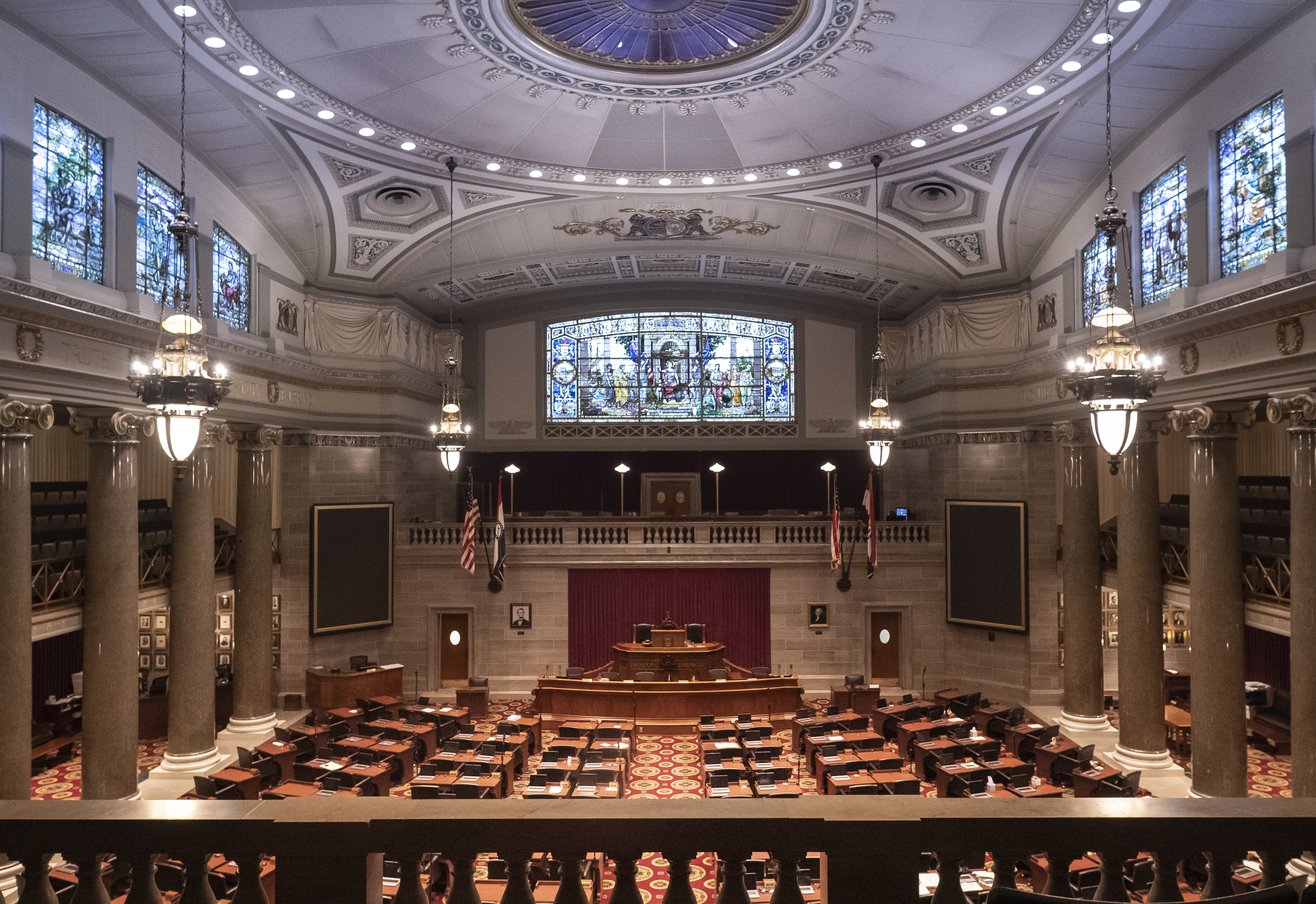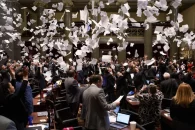During the last week of the session, The Missouri Times will bring you updates of floor activity for each chamber. Below is all the activity in the House from Thursday, May 14. For live updates from the Senate, click here.
The House is in recess until the committee reports for HB 1450 and SB 631 are distributed or 6 a.m., and then will stand adjourned.
The House recessed at 8:30 p.m.
HB 1450, Modifies provisions relating to criminal law, further conference
This bill spent time in the Senate earlier today, during which time handler Sen. Tony Luetkemeyer suggested it go back to conference between the two chambers. It would modify laws regarding controlled substance offenses, covering drug trafficking and products containing fentanyl.
The speaker assigned Representatives to the conference committee after the body voted to proceed.
The House recessed from 5:53 p.m. to 8:10 p.m.
SB 718, military provisions TAFP
The handler moved for a tongue-in-cheek approval. The bill contains numerous details on military recognition days and months, as well as other programs. The body failed to adopt the Senate provisions and changes were quickly rolled back.
The House truly agreed and finally passed this version of the bill by a vote of 130-3.
HB 1330, conveyance of state property TAFP with emergency clause
This bill allows the Governor to authorize the sale or transference of state property in a number of locations in Missouri. It includes an emergency clause as well.
The House passed the bill by a vote of 145-3.
The emergency clause, speeding up the development of land in Ste. Genevieve to the National Park Service before tourism season.
The House approved the clause by a vote of 121-23.
HB 1414, protection of children, TAFP as amended
This bill alters provisions relating to foster homes and reporting of abuse, with sections further elaborating on the care of foster children, homeless youth, and military families. The bill has received support in both chambers on its way through session, having passed through the Senate with a vote of 31-0 on Tuesday.
The House truly agreed and finally passed the bill by a vote of 144-3.
SB 631, Modifies restrictions on the political activity of certain state employees, Passed as amended with emergency clause
The bill has been taken back up, this time with an emergency clause to enact the absentee ballot issue prior to the next election day.
The House voted to third read and finally pass the bill as amended with a vote of 100-48.
The emergency clause was adopted by the House with a vote of 115-19.
The House recessed from 3:47 p.m. to 4:11 p.m.
SB 631, elections, sent to Fiscal Review
This bill would modify provisions on political activities of state employees, allowing state employees not involved in the Merit System or the Uniform Classification and Pay System to run for political office.
The first House amendment alters the title of the bill, while the second features various regulations on the use of absentee ballots during COVID-19. Both were adopted, with extensive debate after the adoption of the second bill over fees, access to absentee ballots, voter I.D., and the necessity and processing of notarization.
Senate passes bill to allow state employees run for local office
A third amendment was proposed Rep. Jason Chipman clarifying provisions on age requirements, residency, fees, salary, and other requirements relating to elected officials. The body adopted this amendment as well.
This bill was sent to Fiscal Review.
The House recessed from 1:42 to 2:42.
SB 739, anti-discrimination against Israel, passed
This bill creates the Anti-Discrimination Against Israel Act, prohibiting political subdivisions from entering into contracts with companies who refuse to do business with Israel. This follows a precedent of the federal standard as well as similar laws in other states.
Discussion turned to the first amendment, with handler Rep. Holly Rehder stating that the bill would not strip businesses of their right to boycott Israel, but would place a new requirement on the state’s decision to contract with businesses. Both sides of the aisle continued to debate the American right to boycott as well as comparisons with similar boycotts and business laws. Conversation also covered international relations, federal and state policy, the rights of businesses, and the history of anti-Israel organizations.
After extensive debate, the House third read and finally passed the bill with a vote of 95-40.
By 95-40 #MOHouse passed the bipartisan Anti-Discrimination With Israel Act! Thanks to the hard work of House sponsor @hrehder! #moleg #mosenate pic.twitter.com/MGPF9lS7So
— Bob Onder (@BobOnderMO) May 14, 2020
SB 774, public safety, passed as amended
This bill modifies provisions to public safety and makes changes to the Capitol Police Board, correction officer confidentiality, and other police departments and boards.
As the upper chamber decries omnibus bills across the building, the House handler of SB 774, Rep. David Wood, moved for a tongue-in-cheek adoption of the House committee version of the bill to strip most of its changes, which the House granted.
One new amendment includes regulations on misuse of drones and their use around certain facilities from Rep. Mike Henderson. Considered amendments to the amendment alter provisions on discriminatory policing, funding for after-school programs, though neither were adopted. Henderson’s amendment was adopted by the House.
The bill was third read and passed as amended by a vote of 129-17.
SB 570, taxation, held on House calendar
This bill alters multiple provisions on taxation, including senior citizens’ services funds, transient taxes, and changes to various taxes and tax credits.
The bill handler, Rep. J Eggleston, moved for a tongue-in-cheek adoption on the Senate’s version on the bill, which would allow the House to work its own language in now — rather than send it back to conference or the upper chamber and risk running out of time. Following floor debate over proposed changes and the priorities in the bill, the House voted not to adopt the substitute, allowing talks to continue.
Eggleston proposed an amendment clarifying language and adding additional provisions to expand benefits to the taxpayer.
The bill is held in its place on the House calendar.
HB 1896, medical marijuana industry, TAFP with emergency clause
This bill adds provisions relating to background checks in the medical marijuana industry. It prevents a state agency from disclosing information of anyone applying for a medical marijuana card to the federal government. It would also add a requirement for a background check for owners, operators, and employees before he or she can operate a medical marijuana facility.
Other provisions include the sale of medications with fentanyl, a key ingredient in methamphetamine production.
The House truly agreed and finally passed the bill by a vote of 113-37.
After the vote, bill sponsor Rep. Lane Roberts proposed an emergency clause making the law effective sooner. The House passed the clause with a vote of 124-21.
House gavels in at 10:07 a.m.
The legislative day officially got underway shortly after 10 a.m. with a prayer and the Pledge of Allegiance. The chamber then approved the House journal from May 13, 2020.

Cameron Gerber studied journalism at Lincoln University. Prior to Lincoln, he earned an associate’s degree from State Fair Community College. Cameron is a native of Eldon, Missouri.
Contact Cameron at cameron@themissouritimes.com.












